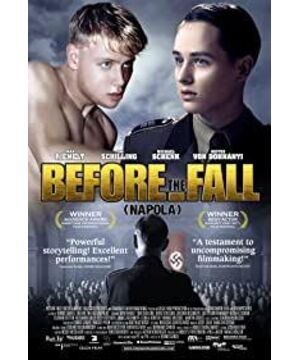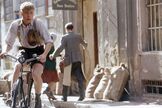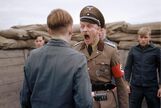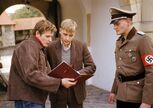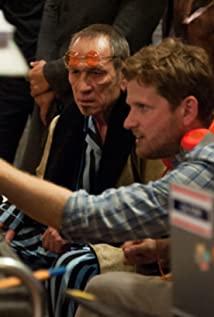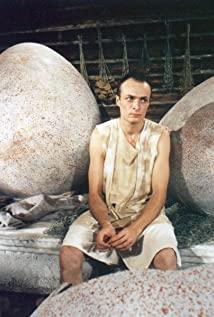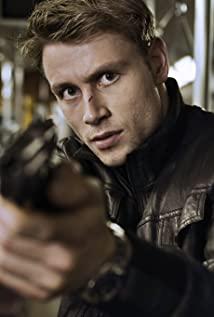Ask, war has nothing to do with roses? This is what I felt first.
During World War II, Germany in 42 years was launching a war of aggression against Soviet Russia and gaining the upper hand. Germany advocated militarism throughout the country, and everyone must first mention "Long Live Hitler" when greeting each other. It seems that in Germany, the most important thing for German youth is to go to the battlefield and kill the enemy on the battlefield. Then at the beginning of the film Friedrich's father maintains his opinion, stubbornly rejecting Friedrich's request to enroll at Napola School, refusing to cooperate with the Nazis, and refusing to be associated with dictatorship. What he represented was the opinion of a minority in Germany during the war, which was pale at the time. The more powerful mainstream was the fanaticism of war and the cult of Hitler's personality. So, when Friedrich wrote in his parting letter that if his father asked him to drop out of school, he would report his father's remarks, his father was forced to adopt silence and patience. At this time, Friedrich represented the will of the mainstream German youth at that time, wanting to dedicate himself to the motherland. So when he got the chance, he ignored his father's objection and left resolutely to study Napola.
Here, Friedrich's father is a rose that blooms silently in the war, which can only grow in the shadows and cannot be exposed. It was a silent revolt against war, against dictatorship, against ruthlessness. Moreover, this rose is not alone, it also grows in Albrecht's heart.
Rose. That is, conscience, compassion, sympathy, and love in human nature.
Obviously, it is also the essence of Christian teaching.
However, Germany at that time was no longer an era when the Middle Ages were so reverent for God. The crude materialism and social Darwinism had already blasphemed the altar with its claws and became the belief of most people. Just by looking at people's words "Long Live Hitler", it can be seen that this is an era of crisis of belief.
So when Friedrich punched, he still had pity in his heart at first, and he didn't want to kill his opponent with one last punch. And his coach kept insisting to him that he should not have pity on the enemy, so as to stimulate his potential. Yes, there is potential, but what is that potential? It is the primitive animal nature of human beings, barbarism. So gradually Friedrich became desperate too, knocking his opponent unconscious in the next game. The most ironic thing is that the audience applauded and applauded loudly, and the poor enemy who fell to the ground was already a bereaved dog and no one cared, and that was all. In this view, Albrecht's father was a faithful believer. There seems to be no spiritual home in his heart. As a father, he ignored the poems written by his son Albrecht himself, and let his son fight Friedrich in the cellar. Although the two are not very happy, it is difficult to be kind. Eventually Albrecht was knocked out with a punch. The crowd gathered around Friedrich to cheer and persuade him to drink, and Albrecht's father hugged him, friendly and affectionate. Albrecht left the stage sadly, walking silently in the dim red light. No one looked at him, no one asked him if he was hurt, no one asked him to recite his poems.
Only himself, alone.
Albrecht is the most flesh-and-blood character in the film, and he is also the film's most human character. He is also a rose in war.
First, he has talent. But his talent was not in military training, but in writing. He is weak, slender, and sentimental. In fact, he does not have the physical condition of a good soldier. He is more like a poet who listens to a nightingale singing under the hazy moonlight of the dark night. Obviously he knew it well, but under pressure from the mainstream and more of his father's wishes, he did not take an antagonistic attitude. He also came to Napola for military training.
Although there is no irreconcilable contradiction with the mainstream, he is still sticking to his spiritual beliefs and moral bottom line. In the scene of capturing the prisoners at night, he was the first and only one who helped the enemy. He grieved, grieved, and screamed because the enemy was only a child and an unarmed person. However, no one resonated with him too much, and Friedrich was watching strangers, those innocent so-called captives dying helplessly. Although he couldn't understand what the other party said, he was clearly touched. Seeing the other party's breathing stop, the snowflakes fluttered in an ethereal manner, melting into the pupils of the person in front of him. His heart was shocked. This also paved the way for Friedrich's subsequent return.
What does every birth and death of life mean? Killing, what is the point of war? How about victory? ...... All kinds of questions are bound to haunt my mind.
Because of this incident, Albrecht ruthlessly criticized his father in a later article. He made no secret of his voice: "In a dream, I was the knight who rescued the princess from the dragon. The hero who liberated the world from the devil. When we went to look for the captive yesterday, I suddenly remembered that dream The little boy who saved the world from the devil. When we came back, I realized I was the devil, the devil I wanted to save the world from."
He reflected.
He stood in the camp of love and compassion, and finally confronted his father clearly.
But destined, between guns and roses, roses seem weak. Albrecht was given an ultimatum from his father, abused by the school, and puzzled by his classmates.
However, I believe that at this time Friedrich already understood Albrecht. But he also knew that at this moment, the rose would only be destroyed. That is, Albrecht would be beaten mercilessly. So he and Albrecht got into a scuffle in the toilet, and they ended up crying on the ground.
At that time, my heart was also beating. I know this is the parting of the two of them.
really. Albrecht was leaving for the next day's snow swimming training. He was in the ice water that was cold and deep into the bone marrow, and his friend Friedrich was close to each other through the thick layer of ice. Although the ice is thick, the water is cold. But their hearts must be warm. At this time, the heart-to-heart communication, love and compassion were silently like the last gift that Albrecht left to Friedrich, and Friedrich finally returned.
It is worth noting that at this time, no one was there to help, no one helped Friedrich dig the ice, and no one jumped into the water to save Albrecht. In this scene, it seems that there are many people, but in fact, it is the silent harmony between Albrecht and Friedrich.
Albrecht eventually submerged in the icy water and faded away. The water color is bright and luminous. Waterless.
The rose eventually went to self-destruction. He swore his own break with the mainstream by self-destruction, unwilling to join forces with it.
The brilliance of faith has also reached its climax here.
As for Friedrich voluntarily giving up his last chance to win, he lost the game and was fired by Napola. It is the final sublimation. It is also the continuation of Albrecht in Friedrich. In the eyes of everyone, this is incomprehensible. And Friedrich knew it well. He was later fired by Napola and had to take off his underwear in person, showing once again that the mainstream was still strong and ruthless.
Friedrich said nothing.
Just walking alone in the wind and snow in silence, drifting away.
On his body, the rose of the proud and unyielding humanity in the war also grew.
I believe that this rose will not wither, but will continue. Continuing into a future unseen by the Nazi regime and mainstream thought at the time.
Just like a poem by Evans:
A blade of justice cannot shake the temple but can shelter the song of pursuit.
War has nothing to do with roses?
There is an answer.
View more about Before the Fall reviews


